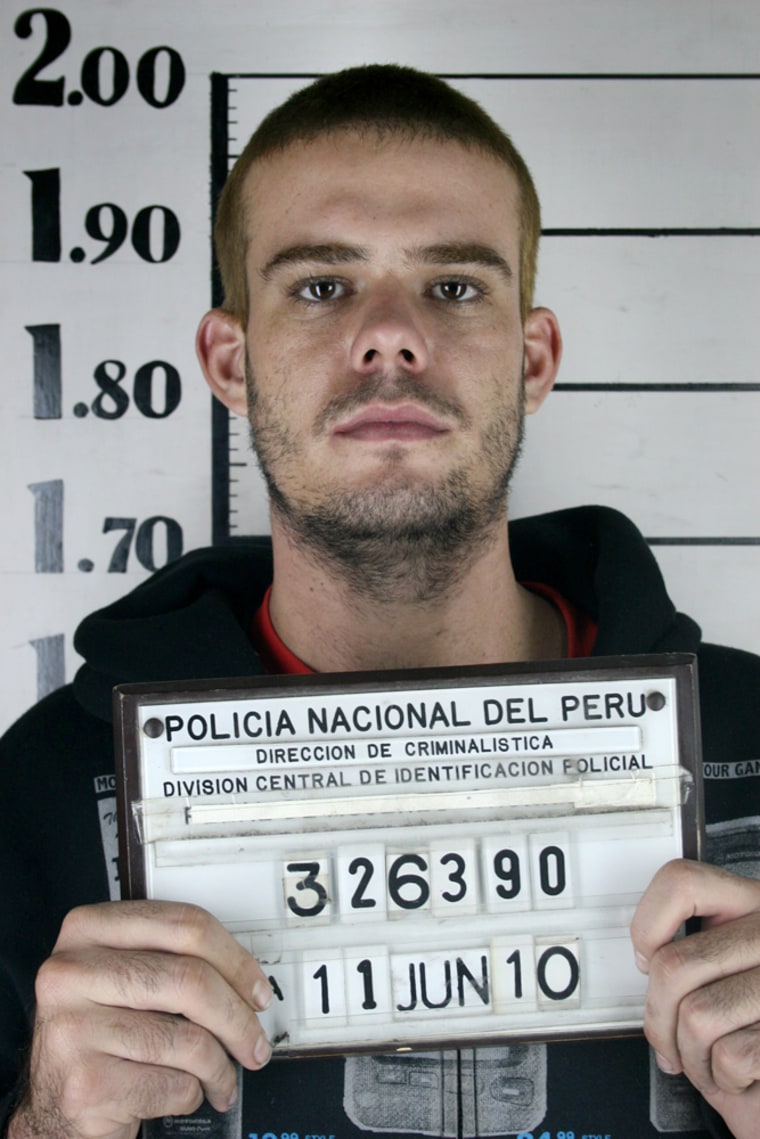The mother of Joran van der Sloot, the Dutchman accused of murdering a 21-year-old Lima student and long suspected in the disappearance of an American teenager in Aruba, says her son needs mental help but is not the monster people make him out to be.
"Joran is sick in his head, but he wanted no help," Anita van der Slot said, breaking her silence on the case in an interview published Saturday in the Dutch daily newspaper De Telegraaf (The Telegraph).
Anita van der Sloot said she won't visit her 22-year-old son in his Peruvian prison cell, where he is awaiting trial in the May 30 killing of Stephany Flores in a Lima hotel room. His cell is next to that of a reputed Colombian hit man.
He is also still the chief suspect in the 2005 disappearance and presumed death in Aruba of Alabama teen Natalee Holloway, though he has never been charged.
"If he did this, he must bear the consequences. I can not embrace him," Anita van der Sloot said. She claims that her son was in recent years developed severe mental problems. " His departure to Peru was a flight to escape being committed to a clinic."
A few weeks ago Anita van der Sloot, said, she found a note from her son: "I'm gone, do not worry." The next time she saw him was on TV, handcuffed by the Peruvian police after his arrest.
For years, she said, she believed Joran when he protested his innocence. "I felt he had nothing to do with the disappearance of Natalee Holloway in 2005. He had left her on the beach. I still believe that. " But, she also says: " Stephany, he may have killed."
Joran van der Sloot was arrested twice in the Holloway case but released when authorities couldn't find enough evidence to try him. His mother says he was traumatized by the ordeal and should have gotten psychiatric help but refused.
"Joran is sick in his head, but he wanted no help," his mother said.
'Sweet boy'
She added that her son is not a monster. "He was a sweet boy who loved animals and his grandmother. Funny, open. He has gradually lost its way. It was insidious."
She said he blamed himself for his father's unexpected death earlier this year.
"Two days Joran cried. He even hung over the coffin, sobbing.
"It's my fault, Dad," he said. "I have caused your heart attack."
Afterward he moved in with his mother in Aruba. But then one day he left, flying to Peru for a poker tournament. Soon after, Flores was killed.
Van der Sloot was arrested in neighboring Chile and brought back to Peru.
"If only he had listened to his mother. Then, this would have never happened," his mother said.
Van der Sloot is being held in a cell in Miguel Castro Castro, a prison compound that houses hundreds of convicts from Peru's leftist insurgency of the 1980s and 90s. He is passing the time watching television and exercising in a secluded section.
The prison — named after the warden of another prison slain by leftist Shining Path rebels in 1985 — is segregated according to the severity of prisoners' crimes, and convicts live with those awaiting trial.
The Rev. Hector Allende, a former bank robber turned evangelical who ministers to the prison population, says other inmates are intrigued by the celebrity defendant in their midst.
But almost none can catch a glimpse of van der Sloot. He doesn't mix with the regular population at the high-security lockup.
The Dutchman has a cell of his own adjoining that of a reputed Colombian hit man in a nearly empty block.
The prison-mates share a TV set — the Colombian's property — and barbells fashioned from a broomstick and water-filled plastic bottles.
On Monday, a judge is scheduled to begin questioning Van der Sloot in private about the slaying of Flores, the daughter of a circus impresario and former race car driver.
He could serve between 15 and 35 years in prison if convicted of first-degree murder in the beating and strangling of Flores, which occurred at his Lima hotel room.
Peruvian prisons director Ruben Rodriguez said there is no way other inmates can get near Van der Sloot. His 6-by-11 foot cell faces the warden's office.
"He told me he feared for his life," Rodriguez said. "If he asks to go elsewhere with the rest, he'll go with the rest."
No phone calls
Rodriguez says van der Sloot has not received phone calls from relatives, though a Dutch Embassy official came.
As for food, van de Sloot gets the same basic meals as every other inmate, Rodriguez said. The day of his arrival, "seco de pollo" — a traditional Peruvian chicken and cilantro dish — was served.
Criminologist Jose Luis Perez said inmates are restricted to their buildings and may not freely circulate, unlike at many other Peruvian prisons.
The prison is relatively peaceful and mafia-free, he said.
The prison's previous director, however, was gunned down outside his home in November in a crime police say may have been revenge for discipline he'd exacted on some inmates.
Three inmates died here in a 2008 brawl.
And the prison was the site of 1992 massacre of inmates when the government attempted to transfer a group of convicted Shining Path rebels to another prison. According to a 2003 report by a truth commission on Peru's brutal conflict, 42 inmates were killed by state agents.
Ricardo La Serna, a Roman Catholic human rights activist who works in prisons, said the Miguel Castro Castro prison of today is a more peaceful place, with some 30 inmates involved in distance learning.
"Some are studying law, others accounting, others administration," he said.
